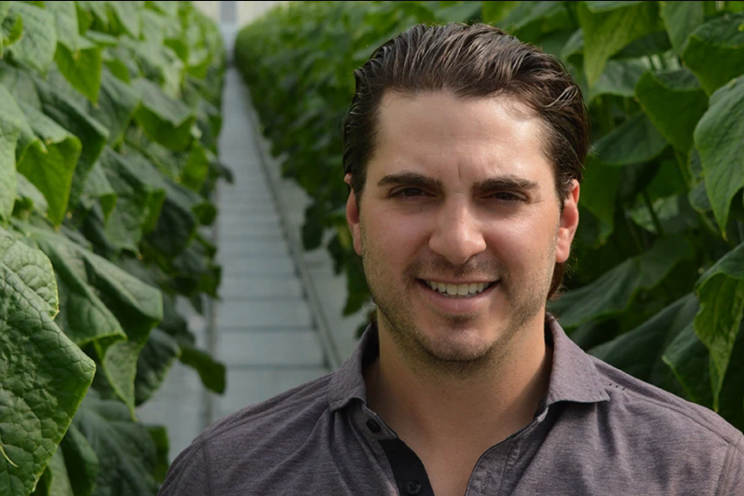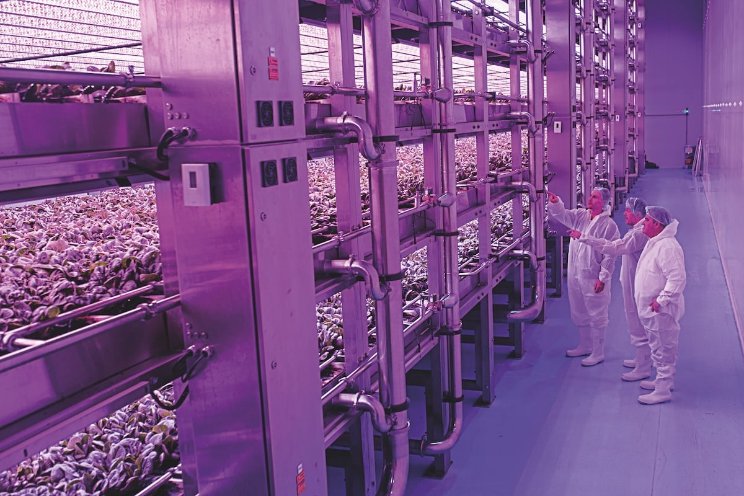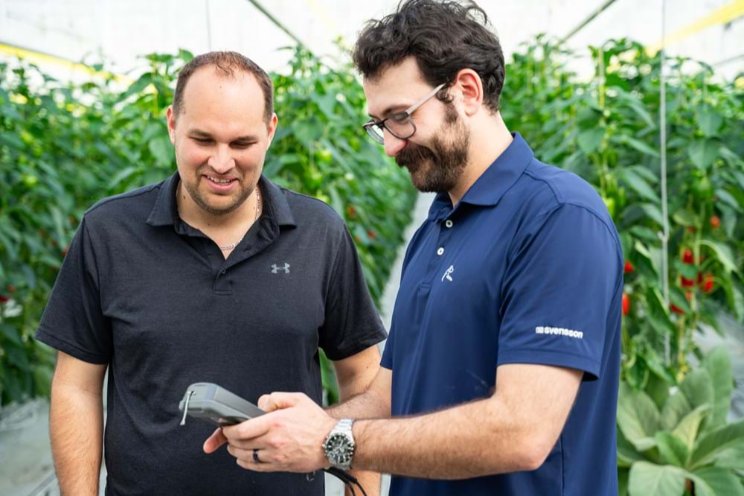"5 lessons I learned from my military experience"
Added on 02 August 2020

In this interview, we are exploring the subject of dealing with crisis and how to adapt and overcome. The context of this series is the physical and financial fallout that resulted from the COVID 19 pandemic. Crisis management is one characteristic that many successful leaders share in common, and in many cases, it is the most important trait necessary to survive and thrive in today's complex market.
I had the pleasure of interviewing Cullen Raichart.
Cullen is the founder and CEO of GreenBroz, Inc., with more than 12 years of experience as an entrepreneur and inventor in the cannabis industry. A veteran of the U.S. Armed Forces, Cullen is considered a distinguished inventor whose drive has earned him a reputation as a pioneer in automation in the emerging agricultural cannabis industry. Cullen's vision for end-to-end harvesting technology has led GreenBroz, Inc. to become a world leader in automated harvesting solutions.
Thank you so much for doing this with us! Before we dig in, our readers would love to get to know you a bit. Can you tell us a bit about your childhood "backstory"?
My parents owned a printing shop, so I saw early on what running a business was all about. At a time when the shop was ready to grow to the next level, my dad took a chance and bought a highly touted, very expensive piece of equipment that unfortunately never quite worked right. This created a chain of events that led to the shop filing for bankruptcy. I remember so clearly how devastating this was for my family. Basically, my dad paid way too much for something that never ended up doing what it was supposed to do. This really hit me hard and informs the values behind my company today. I feel strongly that when a business invests in our equipment, they should get high-quality, thoroughly tested, top-of-the-line machinery. First and foremost, the equipment needs to work perfectly, and secondly equipment cost should not jeopardize a company's success.
And what are you doing today? Can you share a story that exemplifies the unique work that you are doing?
We are currently working on an interesting, and I hope life-saving project. When we started hearing stories of hospital workers on the front lines of the COVID-19 crisis running out of personal protective equipment (PPE), we began looking into retrofitting one of our existing machines that was designed to remediate cannabis, to disinfect PPE. We partnered with Gard'n Clean, a company that makes a unique chlorine dioxide system to put together the PPE Remediator, which has been submitted to the FDA Fast Track approval program. As a veteran, it was important to me to answer the call and to serve our country in these unprecedented times.
Can you tell us a bit about your military background?
I spent 5 years (1988-1993) in the Navy in the first Gulf War, stationed on the USS Abraham Lincoln and the USS Carl Vinson aircraft carriers. I spent most of my time working on avionics, radio, and radar communication systems.
Can you share the most interesting story that you experienced during your military career? What "take away" did you learn from that story?
To see the huge oil fires burning in Kuwait was an experience. I had never seen anything on fire of that magnitude before. All you could see during the day was a grey haze and at night the sky was covered with an eerie, orange glow. I was never in combat, but I was part of the team that brought that conflict to an end. It's important to realize that no matter how small your role is, every member of the team is invaluable in completing the mission. It takes teamwork to make the dream work.
We are interested in fleshing out what a hero is. Did you experience or hear about a story of heroism, during your military experience? Can you share that story with us? Feel free to be as elaborate as you'd like.
The guys I met over there who were putting out the fires were real heroes. They were faced with an impossible situation and they just forged ahead and took care of it.
Based on that story, how would you define what a "hero" is? Can you explain?
The guys I met in port in Dubai who were working the oil fires were real heroes. These fires were so massive and so hot that there was not even a protocol for this kind of thing. There was no template to follow on how to even begin to put them out. These firemen came from all over the world and formed a team to deal with the problem. The solution was ingenious. They ended up putting a giant metal shield on a front loader, just to be able to get close enough and then detonated dynamite to create an air pocket that was big enough to let a crew come in and cap the oil well. These guys were civilians in a war zone dealing with these massive fires. They were just doing it because it had to be done and that was the job they signed up for. I think, heroes are the people who do what needs to be done. They just step up and decide to be part of the solution. This was a huge environmental disaster, and these guys were just focused on solving the problem. They were all humble too. They just had that "Just doing my job" attitude.
Do you think your experience in the military helped prepare you for business or leadership? Can you explain?
Yes, absolutely. First and foremost, I think you have to buy into the mission. In the military, I learned that if your commander is a person you respect and you believe in the mission, then everything flows smoothly. There's a kind of synergy that develops where each person is doing the task they are specialized in, but it all gets kind of put together seamlessly as a whole. This is how I run my business. We are specialists to a degree, but we are cogs in the same wheel. It doesn't turn if each member of the team is not engaged.
I always look for opportunities to let people grow in their positions. If I see someone who's really excelling, I want to create the space to see what's possible. Sometimes in the military, I felt like this was not always done. I would see potential in people that was untapped. I felt like it was a missed opportunity. I never want to miss the opportunity to see someone fulfill their potential on a personal level or in terms of seeing how far the people on my team can go.
None of us are able to achieve success without some help along the way. Is there a particular person who you are grateful towards who helped get you to where you are? Can you share a story?
Mr. Robinson, a private investor stepped up and decided to invest after watching me give a pitch, and I'll be forever grateful for that. His investment is what really started us off. We could not have built this multi-million dollar, international business without that initial investment. Without money behind it, a good idea is well, just a good idea. A good idea with money behind it has potential.
Ok, thank you for all that. Now let's shift to the main focus of this interview. We would like to explore and flesh out how to survive and thrive in crisis. How would you define a crisis?
A crisis can be any number of foreseen or unforeseen events that put your business at risk. The important thing is to have protocols in place to address a number of potential eventualities, those that you can imagine, and those that you can't, like the current COVID-19 pandemic.
Before a crisis strikes, what should business owners and leaders think about and how should they plan?
Insulating your business form risk really centers on having it shored up in all the important areas. You need managers you can trust, available capital in place should you need it urgently, and the ability to pivot with respect to your automation chain should the need arise. You need to have flexibility built-in. For example, produce your own part that you were previously sourcing, or ramp up production of a specific machine on a short timeline.
There are opportunities to make the best of every situation and it's usually based on how you frame it. In your opinion or experience, what's the first thing people should do when they first realize they are in a crisis situation? What should they do next?
The most important thing is to get an idea of the big picture in the short-term and the long-term. Then you can implement your crisis management plan with a clear view to the future. It's important for a business to stop and assess the situation in a comprehensive way, but not to lose too much time. You just have to keep going, keep producing, and keep selling to compete and to grow.
What do you believe are the characteristics or traits needed to survive a crisis?
Maintaining calm is key. My experience in the military taught me that you must remain clear headed and calm or you cannot make good decisions. I am fortunate to have received real training in how to make decisions under pressure in difficult situations during my time in the military. If you are having trouble staying calm, I say work on that first before you make any major crisis response decisions.
When you think of those traits, which person comes to mind? Can you explain why you chose that person?
My son, Isaac who is our Operations Manager comes to mind. He has a unique ability to remain calm and focused no matter what comes his way. I really admire that trait in someone so young. I think for me it took my time in the military to really hone the skill of remaining calm before making a crucial decision, but for Isaac it just seems so natural. I think it's one of the qualities that makes him an effective manager.
Did you have a time in your life where you had one of your greatest setbacks, but you bounced back from it stronger than ever? Can you share that story with us?
Early on I took all of my money out of my 401k and invested it in a machine that I thought was going to be the next big thing, and that turned out not to be the case. So, that was humbling on so many levels, but it also taught me that if you want to accomplish big things, there is no halfway. You are either all in, or you're not in the game. After a big reset, some design changes, and a hefty dose of determination I drove a few completed new machines up to Northern California and left them with a retailer on trial. I nervously drove away, wondering if I would ever hear from them again. I was literally a few hours down the road when they called and said they wanted 8 more. That was a turning point for me. I was exhausted and had maxed out my finances to get to that point. I knew at that moment that I had a viable business.
Here is the main question of our discussion. Crises not only have the potential to jeopardize and infiltrate your work, but they also threaten your emotional stability and relationships. Based on your military experience, what are 5 steps that someone can take to survive and thrive in these situations? Please share a story or an example for each.
1.Protect Your Business
Job one is to protect the business you have and assess whether you need to make quick changes to be able to continue manufacturing and getting product out the door. This was fairly straightforward for us in the current crisis, as all our machines are manufactured in the U.S. we are pretty well insulated from the risks that companies who outsource have. My main takeaway from my military experience has been that creativity is key. People don't often think of creativity when they think of the military, but it takes quick thinking and creativity to solve a problem and keep things running when you have a crisis.
2.Take Care of Your Employees
You have to take care of your people. Without healthy, functioning employees you can't operate. We had to implement changes quickly at our manufacturing facility in response to the COVID-19 pandemic. Strict sanitation and safety measures had to be implemented immediately. In addition to basic safety, it is also the role of the CEO to boost morale. Having watched my commanders in the military give talks to our unit in times of crisis, it really hits home for me how important it is to unify your team, give them a boost when they need it, and to show your appreciation for their hard work.
3.Take Care of Yourself
It can be difficult to remember to take care of yourself. It's easy to get sucked into working around the clock in the midst of a crisis. I try to remind myself that I won't do my best work, or come up with creative solutions if I'm approaching burnout. Taking a few hours to watch a movie, or riding my motorcycle in the desert are a few of the ways I decompress. This time is essential to recharge and protect my mental health, so I can be at my best during this crisis we are all facing, and lead my team into the future.
4.Manage Current and Future Customer Relationships
Clear and transparent communication is essential in a crisis. You must communicate effectively with your customers so they know what to expect during a crisis. Will manufacturing be delayed? Are orders still shipping domestically? What about international orders? In response to the COVD-19 crisis we have a message on our website, and we have reached out to customers directly to update them on the status of their orders.
5.Identify Opportunities
In times of crisis sometimes opportunities will present themselves that didn't previously exist. I would have never thought we would be making a PPE Remediator, but here we are.
Ok. We are nearly done. You are a person of great influence. If you could inspire a movement that would bring the most amount of good to the most amount of people, what would that be? You never know what your idea can trigger. :-)
Just being present can be a radical idea. Being present with what is happening right here, right now is something we can all benefit from. In business, like in the military, reactivity will get you killed. You need to proactively live in the present moment, and see it for what it is. No sugar coating it, or rationalizing why you are in the predicament you're in, just honest acceptance of the crisis. This kind of clear-headed evaluation of a situation leads to decision making that is most effective in the long run and that is likely to be based on sound information.
We are blessed that some very prominent leaders read this column. Is there a person in the world, or in the US with whom you would love to have a private breakfast or lunch with, and why? He or she might just see this, especially if we tag them :-)
It would be interesting to lunch with Warren Buffet. Not so much because I'm interested in investing, but more because he has an interesting way of seeing things. This goes back to the whole being present thing. He seems to have a real talent for seeing a situation with such clarity for exactly what it is. I think this skill has led him to make extraordinary business decisions. I also really respect that he donates generously to a number of charitable organizations.
How can our readers follow you online?
Thank you so much for these amazing insights. This was truly uplifting.
Source and Photo Courtesy of Medium
Source: Medium
More news















